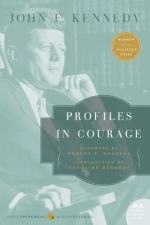
|
| Name: _________________________ | Period: ___________________ |
This quiz consists of 5 multiple choice and 5 short answer questions through Chapter 9.
Multiple Choice Questions
1. What is the irony of Houston's defending the Northerner's rights to abolition?
(a) Houston was a slave to the Cherokee.
(b) Houston opposed slavery except in the South.
(c) Houston owned slaves himself.
(d) Houston disliked all Yankees.
2. What position did Lamar take after the Civil War?
(a) That people should save their confederate money.
(b) That those who supported the Union should be tried as war criminals.
(c) The way to end the South's suffering was compromise and reconciliation with the North.
(d) That laws needed to be enacted to punish carpetbaggers.
3. Why was Webster a leader in the North prior to the Civil War?
(a) He had strong views against slavery.
(b) He could out talk his opponents.
(c) He was older than any other politician.
(d) He knew all the words in the dictionary.
4. What did Robert A. Taft have in common with John Quincey Adams?
(a) They both went to the same university.
(b) They were both Quakers.
(c) They both went on to serve on the Supreme Court.
(d) Both of their fathers had served as President of the USA.
5. What was leaked to the newspapers that did away with American public resistance to the Armed Ship Bill?
(a) The Kaiser's war zone warning.
(b) The sinking of the Titanic.
(c) The Mexican conspiracy.
(d) The Zimmerman note.
Short Answer Questions
1. To whom was Ross compared in a Kansas newspaper editorial?
2. Which of the following public offices did John Quincey Adams NOT hold?
3. Who was the Senator from Nebraska who opposed President Woodrow Wilson's Armed Ship Bill?
4. What metaphor does Kennedy use to describe the relationship between the elected official and the electorate?
5. Who said that courage is grace under pressure?
|
This section contains 308 words (approx. 2 pages at 300 words per page) |

|




